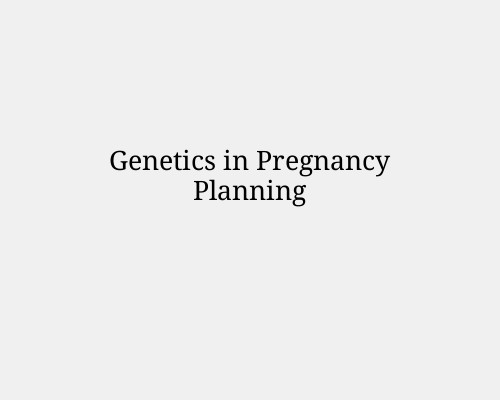
Genetics plays a crucial role in pregnancy planning, influencing both the health of the baby and the potential risks involved in conception and childbirth. Understanding genetic factors can help prospective parents make informed decisions about their reproductive journey. This article explores the significance of genetics in pregnancy planning, the types of genetic testing available, and how genetic counseling can assist couples in mitigating risks.
Understanding Genetics in Pregnancy Planning
Genetics is the study of how traits and conditions are passed from parents to their children through DNA. Each parent contributes 23 chromosomes, combining to form a unique genetic blueprint for the child. Inherited genetic traits determine characteristics like eye color, hair type, and height. However, they can also carry the risk of inherited diseases, making genetics a vital factor in pregnancy planning.
Genetic Conditions and Inheritance Patterns
Some genetic disorders can be passed down through families. The mode of inheritance can influence the likelihood of a child inheriting a condition:
Autosomal Dominant Disorders: A single copy of the altered gene from one parent can cause the disorder. Examples include Huntington’s disease and Marfan syndrome.
Autosomal Recessive Disorders: Both parents must pass on a defective gene for the child to be affected. Examples include cystic fibrosis and sickle cell anemia.
X-Linked Disorders: These conditions are linked to the X chromosome and are more likely to affect males. Examples include hemophilia and Duchenne muscular dystrophy.
Multifactorial Disorders: These result from a combination of genetic and environmental factors, such as cleft palate, heart disease, and diabetes.
Genetic Testing and Its Role in Pregnancy Planning
Genetic testing can help determine whether prospective parents carry genes that could increase the risk of passing on genetic disorders. The most common types of genetic tests include:
Carrier Screening: Identifies whether an individual carries genes for certain inherited conditions, even if they do not have symptoms themselves.
Preimplantation Genetic Testing (PGT): Used in conjunction with in-vitro fertilization (IVF) to screen embryos for genetic abnormalities before implantation.
Prenatal Genetic Testing: Conducted during pregnancy to detect genetic conditions in the fetus. This includes non-invasive prenatal testing (NIPT), chorionic villus sampling (CVS), and amniocentesis.
The Role of Genetic Counseling
Genetic counseling helps couples understand their genetic risks and make informed reproductive choices. A genetic counselor:
Reviews family medical history to identify potential risks.
Explains the inheritance patterns of genetic conditions.
Discusses available testing options and their implications.
Helps couples navigate difficult decisions regarding conception, pregnancy, or alternative options like egg/sperm donation and adoption.
Lifestyle and Environmental Factors
While genetics plays a significant role, environmental factors such as maternal nutrition, exposure to toxins, and overall health also impact pregnancy outcomes. Maintaining a healthy lifestyle, avoiding harmful substances, and ensuring proper prenatal care can help mitigate genetic risks.
Conclusion
Understanding genetics in pregnancy planning is essential for ensuring the health of both the mother and the baby. Genetic testing and counseling provide valuable insights that can help couples make informed decisions. By addressing potential risks early, prospective parents can take proactive steps toward a healthy pregnancy and a healthy baby.